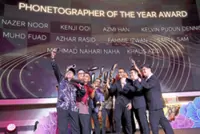WHETHER you’re an undergraduate looking to continue your academic path or a professional planning to return to studies, there are many things to consider with a postgraduate degree –from the costs and funding, the choice of higher learning institution to employment prospects once you’ve secured the qualifications.
Universiti Teknologi Petronas (UTP) understands these considerations, which is why its internationally-acknowledged postgraduate programmes undergo rigorous checks and balance to ensure that the courses are robust and meet the needs of industry.
“We can say that all of our MSc postgraduate courses for example, serve the entire spectrum of the oil and gas industry from the upstream sector with courses like MSc in Petroleum Geoscience, MSc in Petroleum Engineering, MSc in Drilling Engineering and MSc in Offshore Engineering to the downstream sector with programmes like MSc in Process Integration, MSc in Industrial Environmental Engineering and MSc in Electronics Systems Engineering, ” says UTP Deputy Vice Chancellor Academic Prof Ir Dr Hilmi Mukhtar.
Although the postgraduate programmes offered encompass the entire value chain of the oil and gas sector, Prof Hilmi is quick to point out that there is a great deal of crossover to other sectors as well.
The university’s postgraduate programmes such as MSc in Asset Management and Maintenance, MSc in Corrosion Engineering, MSc in Process Safety, MSc in Applied Computing, and MBA in Energy Management for instance are applicable to many industry sectors including infrastructure, energy, utilities, and technology.
Each of the UTP master programme by coursework has been designed to develop the required skills, expertise and experience so that these graduates can then contribute and play a vital role within their chosen fields.
The university’s outcome-based academic programmes begin with a deliberation on the objectives, followed by a thorough mapping of the course content with priority on the subjects and modules meeting industry demands.
Through UTP’s expert panel workshop, members of its industry advisory panel, subject matter experts from other institutions and professional bodies, and international external examiners deliberate on the details of the respective programmes.
This level of rigour is applied to ensure that the curriculum for each programme is relevant to industry needs and are benchmarked globally. It is only when the programmes meet all the established criteria that it is given the thumbs up by the university and submitted to the Government for approval.
Prof Hilmi shares that the expert panel workshop is also convened when existing curriculum comes under review.
“We review the postgraduate by coursework programmes every four years, where once again we take input from industries and make the necessary changes. We either enhance the content, enhance the delivery or enhance the assessment, ” he says, pointing out that this ensures that the courses are relevant and fit for purpose.
UTP’s postgraduate students benefit from all the extensive planning, design and evaluations that the programmes are subjected to – gaining exposure to a wide array of real industry challenges and case studies as well as experiencing multisided learning approaches such as seminars and projects.
The university’s collaborations with global industry giants such as Shell, Schlumberger, Mitsubishi, Baker Hughes, Halliburton, and locally with Mimos Berhad, Muhibbah Engineering and Petronas subsidiaries offer students a fulfilling academic experience.
Healthy discussions between professors and students have a profound impact on the learning experience.
The coursework programmes, which also include industry-based projects and assignments, can also be applied to solving real problems in the industry.
“If you are an engineer carrying out maintenance in an oil and gas company, for example, you can use the findings from the project to enhance current processes. That way you don’t just develop your own expertise but it also benefits the organisation, ” says Prof Hilmi.

UTP’s excellent research facilities offer students access to industry data and practices for project work – utilising the latest software tools and simulation packages.
The university’s ultra-modern information resource centre also offers multifaceted facilities and stores more than 200,000 books, journals and periodicals.
Postgraduate students will also benefit from being immersed in the university’s dynamic research environment that encompass two broad research themes – energy sustainability and smart communities – in which house six research institutes (Institute of Contaminant Management for Oil and Gas; Institute of Hydrocarbon Recovery for Enhanced Oil Recovery; Institute of Autonomous System for Autonomous Facilities; Institute of Health and Analytics for Personalised Care; Institute of Self-Sustainable Building for Smart Living; and Institute of Transport Infrastructure for Smart Mobility.
For more information on UTP’s postgraduate programmes, visit www.utp.edu.my





